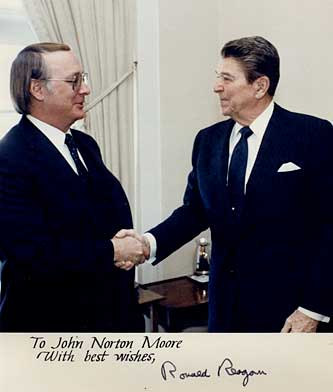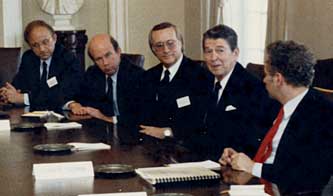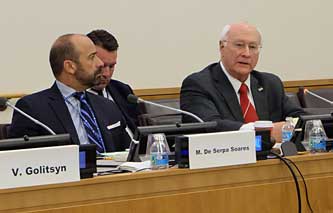Professor John Norton Moore, an educator, diplomat and public servant who has worked to promote the rule of law around the globe, will retire from the University of Virginia School of Law at the end of this month after 53 years on the faculty. Among his major accomplishments, he helped lay the groundwork for the Law of the Sea Treaty, currently in force for 168 countries and the European Union.
Moore leads both the Center for National Security Law and the Center for Oceans Law and Policy at UVA.
From 1973 to 1976, Moore chaired the National Security Council Interagency Task Force on the Law of the Sea, resulting in the United Nations Convention on the Law of the Sea, which extends the rule of law to the world’s oceans.
“We were negotiating with over 130 countries in the world,” he said. “Basically, we were negotiating a constitution for two-thirds of planet Earth. The UNCLOS Convention is second only to the United Nations Charter in its importance as a multilateral treaty.”

Later, the Center for Oceans Law and Policy, which he founded in 1976, produced an exhaustive article-by-article analysis of the treaty.
“The center commentary is the definitive document that the Law of the Sea Tribunal in Hamburg would go to,” Moore said.
Throughout the years, the United Nations, U.N. specialized agencies, and nations as diverse as China, Germany, Indonesia, Russia and Sweden have co-hosted annual conferences with the center. The center also hosts a law of the sea training institute for diplomats, government officials and scholars through the Rhodes Academy in Greece, which the center founded 25 years ago.
Moore also helped establish the field of national security law. He taught the first course on the subject in the 1970s; created the Center for National Security Law in 1981 (and worked with other universities to help them found similar centers); and in 1991 published the first casebook on the subject, “National Security Law,” now in its third edition.
The Center for National Security Law has advanced the knowledge of working national security law professionals, and even members of the judiciary, through its seminars and outreach. While the center doesn’t directly lobby or advocate for policy, Moore said the U.S. Senate adopted the Convention on the Prevention and Punishment of the Crime of Genocide in the 1980s, in part due to the center’s initiatives and educational efforts.
In addition, Moore was a four-term chairman of the original American Bar Association Standing Committee on National Security Law. Under his leadership, the committee launched an annual conference in Washington, D.C., that now attracts hundreds of participants.

“In fact, I changed the committee name,” Moore said. “The committee had earlier been called the Committee on Education Against Communism under the leadership Lewis Powell, who, of course, later became a Supreme Court justice.”
Moore has also served his country both while taking leave from Virginia and while a full faculty member. In part, this service includes:
- During the 1970s, he served with leave for a four-year period, first as counselor on international law to the Department of State and then as ambassador and deputy special representative of the president for the Law of the Sea Negotiations and chairman of the National Security Council Eighteen Agency Task Force on the Law of the Sea;
- From 1985 to 1991, he chaired the board of directors of the U.S. Institute of Peace, one of six presidential appointments he has held. (Professor Robert F. Turner, the retiring associate director of the Center for National Security Law, was the institute’s first president. Read more.)
- During the 1980s, he served on the board of the nongovernmental organization Freedom House, where he initiated and wrote the first draft for what later became the Community of Democracies, an international organization devoted to the promotion of democracy and the rule of law;
- With the deputy attorney general of the United States, Moore was co-chair in March 1990 of the U.S.-USSR talks in Moscow and Leningrad on the rule of law, and he drafted and presented the overview paper for the United States;
- From 1991-93, during the Gulf War and its aftermath, Moore was the principal legal adviser to the Kuwait ambassador to the United States and to the Kuwait delegation to the U.N. Iraq-Kuwait Boundary Demarcation Commission.
Moore is the author of more than 40 books, including the influential “Solving the War Puzzle,” which advances theories on the causes of war, and how to prevent them. He recently co-edited “Lifting the Fog of War: New Thinking About War and War Prevention,” which updates his theories. And he has just completed a new book, “The Trillion Dollar Hoax: How an Isolationist Narrative against the Law of the Sea Treaty Betrayed America.”
In all, he has authored more than 200 articles, monographs and book chapters.
“I have known John Norton Moore since the 1970s, when I was honored to contribute to a massive collection of readings and documents that he produced on the Arab-Israeli conflict,” said Yoram Dinstein, a prominent authority on the laws of war and Professor Emeritus at Tel Aviv University. “In all, if I am allowed to paraphrase what has been said about another Virginian some time ago, I would sum up my overall impression of John by suggesting that he is first in the law of war, first in the law of peace and first in the hearts of his colleagues everywhere.”

Moore received his J.D. from Duke University in 1962 and his LL.M. from the Illinois College of Law in 1965. He subsequently pursued post-doctoral work at Yale before transitioning to Virginia.
He retires as the Walter L. Brown Professor of Law.
“I have had the greatest respect for the leadership of the law school throughout my half-century tenure,” Moore said. “It’s been a privilege to be a part of this great faculty and to have worked with such outstanding students. Virginia also provided a wonderful opportunity to work to make a difference in the world — and I hope I’ve made a few that matter.”
While he may be retiring, he’s not slowing down. He is currently working with about 30 international legal experts, including Dinstein, to create a manual for use of force in international relations.
“There are many manuals on jus in bello, the legal rules on how you fight wars, but there’s no comparable manual dealing with jus ad bellum, or when it’s lawful to fight wars,” Moore said.
With Moore, there’s the belief that his personal best is always yet to come. A competitive weightlifter, he won the world championship in Tokyo in May 2019 in the 70-and-up master’s category for the bench press. He sang along to the National Anthem as he stood on the podium.
He has been an eight-time member of the United States National Powerlifting Team in the World Championships, winning one gold, one silver and three bronze medals, and an eight-time member of the United States National Team in the North American and Pan American Championships, winning numerous gold medals. He holds two United States national records for the bench press.
For a more in-depth look at Moore’s career, see “The War-and-Peace Professor,” which marked his 50th anniversary at UVA Law.
Founded in 1819, the University of Virginia School of Law is the second-oldest continuously operating law school in the nation. Consistently ranked among the top law schools, Virginia is a world-renowned training ground for distinguished lawyers and public servants, instilling in them a commitment to leadership, integrity and community service.


